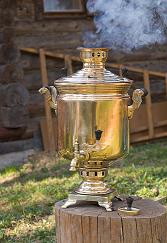Cultural Habits
The culture of Russia, a transcontinental country of Eastern Europe and Asia, first refers to the observable cultural practices of its inhabitants (147 000 000, estimate 2017). Russian culture refers to all the artistic productions (in the broad sense) that originated in Russia or were born of Russian-speaking authors. Due to the vastness of its territory, its late cultural development and the authoritarianism of its political regimes, Russia has given birth to original cultural works, some of which have marked well beyond its borders: novels of Fyodor Dostoevsky or those of Leo Tolstoy, the theater of Anton Chekhov, the poems of Alexander Pushkin or Sergey Yesenin, the music of Pyotr Ilyich Tchaikovsky, Igor Stravinsky, the painting of Vassily Kandinsky or Marc Chagall ...
The two world wars and the Soviet experience profoundly changed Russian cultural life in the twentieth century. In addition to the exile of a part of its intelligentsia, the Russian Revolution caused a "freeze" then a "thaw" cultural that affected society as a whole. Conducted under the aegis of the Communist Party, inspired by "socialist realism," however, Soviet culture was marked by works such as Mikhail Sholokhov's The Peaceful Don, or that of Alexander Solzhenitsyn, that of the composer Dmitry Shostakovich, or certain achievements of the cinema. Soviet, as Sergei Eisenstein's Battleship Potemkin ...
The collapse of the Soviet regime in 1991 provoked a new cultural and social shock and placed the Russian world before its traditional questions: to follow the Western path or to attempt a specific development.
In addition, an extremely demanding training system has enabled the emergence of many internationally renowned artistic talents, starting with the ballet companies of the Bolshoi Theater or Mariinsky.
There is a big difference between the Russian tradition of hospitality and a friendly attitude towards guests in other countries of the world. The legends about the breadth of the Russian soul have a very good reason to exist. Russians love to accept guests and make great hosts. When in Russia, you don't need to wait for a special occasion like a birthday or a holiday to visit a friend or a neighbor. Russians like visiting each other, meeting in friendly companies for dinner, or just stopping by to catch up on what's going on. The latter is called "to drop in for a cup of coffee" (забежать на чашечку кофе).

Banya (a Russian type of sauna, a kind of steam bath) is one of the oldest Russian traditions. Despite the fact that this tradition is several centuries old, the banya is popular even today. You can find banyas in large cities and small towns. Usually those Russians who have summer cottages, almost always build their own banya there.

Samovars and tea-drinking are an indispensable element of Russian culture. In modern Russia, samovars are rarely used to boil water for tea as originally intended, however many families place samovars in the center of the table during holiday celebrations. Reserving pride of place for a samovar at the festive table is both a tribute that Russians give to their ancestors and a ceremony that embodies warm-hearted hospitality.


/https%3A%2F%2Fstorage.canalblog.com%2F26%2F30%2F1579423%2F119895579_o.jpg)
/https%3A%2F%2Fstorage.canalblog.com%2F51%2F68%2F1579423%2F119895903_o.jpg)
/https%3A%2F%2Fstorage.canalblog.com%2F30%2F28%2F1579423%2F119261907.jpg)
/https%3A%2F%2Fstorage.canalblog.com%2F16%2F49%2F1579423%2F119895704_o.jpg)